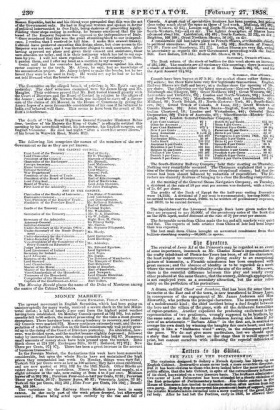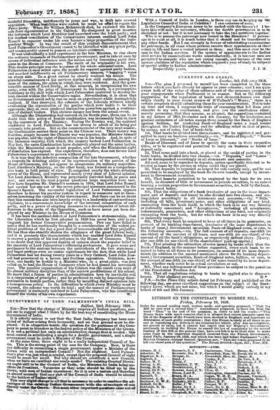,Aistilli,Au #42 Eititim
'THE DI eTaToitsirri: The explosiorr. designed■U■ deatroy a French dynastyhas'"Uof'wn' dp, an • English Cabinet. Destructive atoms never Leek a more eccentric direction. But it has been obvious to those-who have looked below the mere surface of public affairs, that the late Cabinet, in spite of the extraordinary influence of its chief, has existed. on a very insecure basis. The brilliant administra- tive career of Lord Palmerston has been attended by a steady violation of the first principles- Of Parliamentary tactics. .Rim whole conduct in the House of Commons has tended to eliminate aeetion after section from Ins own party. Step, by step he-narrowed his permanent Widget support, lklilca the reliable Ilimaterialists dwindled into a mere nucleus of the great Libe- ral body. After he had lost the Peelitee, early in 1855, he allowed their dattiVlfriendehip, indifferently in peace and war, to drift into avowed oPpOiitian..''Nfienhootilities were ended, he made 'no effort to regain the Peace Carty.' • When Sir William Moleicworth died,. be excluded the 'fedi- cals frothrepresentation in the ,CerhineT:: He dissipated in great measure the infhieflie which :Len, Aberdeenhaii exercised-over the Irish perty ; and hie- stediedi•exiciliation• of ' the ConSeObtire,'Mtereet enablectlerd John Russell to orgninee under la own bail hilirge proportion of the hide, Eus pendent-Whigs. lt, we the result of ,. — gi'adual disinemberinent that TAM Paliveraton'a Government ceased to ' identifiedwith any treat party,
and Coniequently ceased to pociaesi ahintrinexittenee. - • • : It 'weir undetedl fe bold experiment inthe late Minister, to rise above
the ordinary Of Parlianientary.goveminent and to rele-at once by means of.individnalinfluenee with the nation and by, fomenting party divi- sions in the Ilouenof Commons. The merit of. its originality mhis own. This double principle was-the keystone of his whole administration. Lord Pahnerstonat Mice relied upon the -people for support.against party faction, and poached indifferently. on all Parliamentary nianers, "- bagging" votes on-every side: . To.er , great extent he dearly- realized. his design. The grateful reinerninunee.of his seevices.during war, still outlive+, map& the mem of the mitten, the crisis in whialithey, were rendered. Ancltlije..quesr_ tionahlS:.ffilecesa at 1.,erci Derby, at , tb,i8 7110930101 in reorgaMbing lua own parV,..eyen with the • prize of Government in his hands, is apreauriptire testimony to the skill with -which Lent-Palmerston antrivecl to dexolop la,. tent, discordwithin the Conservative ealer. Neverthelente Aria -Olear that no ,Goverinuat, could safety rest en ernhanexperiment,while .innompletely realized., ,M they clestreyed,the. ceheAcui Of Dm Libael,e4eithent,Wlially eradicating the, erganizetion , of 'the parties .which were liable, to, be their opponents, they at -once rendered themselvespowerless-against a: combina- tion of dietert leaders.. This obvious dang;er•bas been the actuaLearent. . Although the D.4 tatopship, had entered.on. its Muth year, theme-4.13p doubt that Una peliwof hostile combhiation was inceesaatly held,myhaw by-the opponents of the Afinistry.. During the Russian war, the.national confidence in Lord: Palmerston was teo ;strong to admit of its being net seriously into practice. Bet at the comniencement of the-very next semen, the Combination :carried their-point On the Chinese war. Their viotoryiwas fruitless, simply bericae.the Chinelre War }was yopular, the Minister himself was pep OM', -ancl•the right of dissointion was M. his hands. And in spite of the idunense majOrity-with Which, the Country backed Lord Palmerston in May hest, the same .Combination lia:vn deffisirely played out the same. tactics, when .the Ministerial ;anise is not popular, and when the Ministerial right of dissolution has expired. Our experience, therefore, does not favour Lord Pahrienston's experiment to govern ivithoutparty. It is true that the defective composition of the late Government,. whether as respects its debating ability or its representation of the parties of the House of:Commons, did, not appear to. compromise it ordinary majoifree Lord Alierdeerf,s1ffinistry„, on the other hand, was formed Oil a eom_pr n.- sive basisi in bath points of vie*. Itcomprised nearly thewhole debating pewee of the House, and represented nearly every class, of Liberal Opinion. Yet Lord Aberdeen's Ministry was perpetuallY outvoted. brath, in peace end -war; and ellen on theMost popular questions large majorities were rare. Few have forgotten Mr. Dieraelife eareasm in 1864, that Lord John Russell had carried but °neat of 'the seven principal measures announced in the Queen's Speech. The successful legislation of Lord Palmerston ap 'ears therefore to•favour his peculiar system M regard to measures- not in t .... selves involving the vitality of the Government. But there can no doubt that this_ success has also been largelyowing to a leadership of .extraordinary vigilance, to a consummate knowledge of the internal composition' of each party, and to a power of adapting measures to a development of latent dif- eeencee . in the Tanks of the Ofreition,_ such as have never: yet - been.dia- played by any Minister in the eine of Commons. • -
It has:been theirerditial defeat: Of Lerel Palmerston's stateenlanshiPr that the Liberalism which he 'first, adopted in 1830 has never been able te ex- tinguish his fernier Conservative prepossesaiens. Pew can have filled to notice that he has continually brought-to a consideration of' the widest po- litical problems of the day a good deal of irreconcilable old Tory prejudia. Ile-ha thug abosteadlly-shaken the allslianee of the great Liberal body; and it is precisely this characteristic which hair' enabledliord John Russell to recover a portion of his lost influence in the-House of Commons. There is no doubt that this apparent duality of opinion shook the popular belief in the sincerity of Lord Palmerston's reforming professions. It gave scope end pertinenee to' theContrast' 'between the antecedents of the two statesmen ; andbegetperhaps-even 'an undue: signifienna forth° fact, that while Lerd Pahnerston had sat during twenty-years ina Tory Cabinet, Lord John Rule'
sell had persevered in a- barren.: axid:fruitlese opposition. .Critioient, how= ever, can-hardly be hostile to-a, Iiinisiterieho' in a gresitsnais, wasfir4 called on to lead the,liouse of Comincm o when he had passed his seventieth
year. The peculiar orgenization of his Cabinet was the result even more of his almost military clisciplinelliret of the arrow predilections of his school. Ile knew, that 0 fusion of partiesm administration bore it inevitable evil in a comprotnise of prineiplei , and he preferred to rule by fomenting diaor4 ganization in hostile parties, rather than by Moulding distinct opinions into a homogeneous policy. In the difficulties to which every Ministry must be exposed, the scheme was worth its trial ; and the science rif Parliamentary government is eminently indebted to Lord Pelmeratoin Who has constituted himaelf the victim of his own experiment. ' • • W.



























 Previous page
Previous page